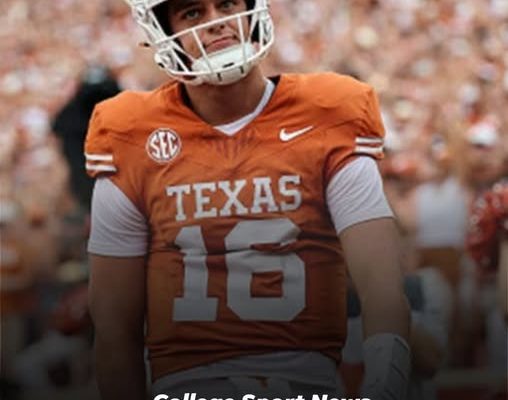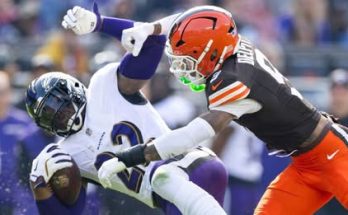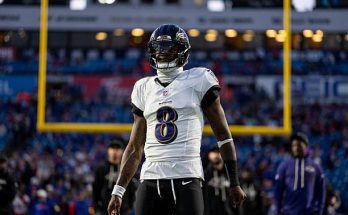ESPN’s Pete Thamel recently reported that Billy Edwards Jr., the starting quarterback for the Wisconsin Badgers, is “unlikely to participate” in the team’s upcoming matchup against Alabama, a revelation that has instantly sent shockwaves through college football circles. This news comes at a critical juncture in the season, as the Badgers prepare to face one of the most formidable programs in the nation. The absence of Edwards Jr. from such a pivotal game raises countless questions about the team’s strategy, morale, and ability to compete at the highest level. Fans, analysts, and casual observers alike are now left wondering how Wisconsin will adjust and who will step up in his absence.
Billy Edwards Jr. has been a cornerstone of the Badgers’ offense, and his leadership on the field has been a key element in the team’s successes. He possesses a rare combination of poise, agility, and decision-making skills that make him not only a strong passer but also a quarterback who can elevate the performance of those around him. Losing a player of his caliber for a game as high-profile as the one against Alabama could have significant ramifications. Yet, while his potential absence is certainly concerning, it also opens the door to intriguing possibilities and compelling storylines that will captivate fans this weekend.
One of the most immediate considerations is how the Badgers will adapt their offensive game plan without their starting quarterback. Coaches are likely to explore a variety of adjustments, from leaning more heavily on their running game to deploying alternative quarterback options who can maintain rhythm and composure under pressure. This scenario provides a fascinating opportunity for players who may not typically see extensive time on the field to showcase their abilities and make a name for themselves on a national stage. For fans, it’s a chance to watch the resilience and depth of a program tested in real time.
Alabama, of course, presents a unique challenge. Known for its dominant defense and disciplined approach under high-pressure situations, the Crimson Tide will likely look to exploit any perceived weaknesses in Wisconsin’s offense. Fans and analysts are keen to see how the Badgers’ coaching staff will counter this challenge, and it is precisely these kinds of high-stakes matchups that generate endless discussion and debate among the college football community. Will the team pivot to a more conservative, ball-control approach, or will they take calculated risks to keep Alabama off balance? Each potential decision fuels the excitement and speculation surrounding the game.
Beyond the technical aspects of the matchup, there is a human element to consider. The news about Edwards Jr. inevitably sparks conversations about leadership and resilience. How will his teammates respond to the uncertainty of his status? How will the team maintain focus and motivation in the face of adversity? College football is filled with examples of teams rising to the occasion when key players are sidelined, and this scenario may serve as yet another opportunity for the Badgers to demonstrate their grit and unity. Fans have a vested interest in seeing how such challenges are navigated, making the story about more than just one player or one game.
Moreover, Edwards Jr.’s situation also raises questions about his future, both in terms of his immediate role in the team and potential implications for his career. Will he recover in time for future games, or is this a sign of a larger issue that the program will need to manage carefully? How will this affect the team’s standing and their path in the remainder of the season? These questions are central to the ongoing dialogue among fans and experts, and they encourage meaningful engagement from those who follow the sport closely. Readers are invited to share their perspectives, predictions, and insights about what this development means for both Edwards Jr. and the Badgers as a whole.
The potential absence of a starting quarterback also has broader implications for the dynamics of the team. When a key player is sidelined, it can force others to step up in unexpected ways, highlighting depth and versatility within the roster. For fans, this is a chance to witness emerging talent, as backup quarterbacks, receivers, and offensive linemen may have the opportunity to take on heightened responsibilities. The unpredictability adds to the excitement and drama of the game, as every play becomes a chance for a lesser-known player to shine on a national stage.
In addition, the timing of this news adds another layer of intrigue. Alabama has long been considered one of the elite programs in college football, and any matchup against them garners national attention. Fans from both teams, as well as neutral observers, are likely to scrutinize every detail in the lead-up to the game. From pregame preparations to in-game adjustments, the absence of Edwards Jr. becomes a focal point for analysis, debate, and speculation. Social media conversations are bound to be vibrant, with fans weighing in on potential strategies, player matchups, and even predicting outcomes. This type of engagement not only enriches the fan experience but also fosters a sense of community around the sport.
As discussions heat up, it’s also worth considering the emotional impact on fans and alumni. College football has always been about more than just wins and losses; it’s about shared experiences, school pride, and the stories that unfold on the field. The news about Edwards Jr. invites fans to participate in those narratives, to speculate, and to rally behind the team regardless of the challenges. Engaging in these conversations is part of what makes college football so compelling, as fans contribute their own knowledge, intuition, and passion to the broader dialogue.
It’s important to note that while Edwards Jr.’s status may seem like a setback, it could also serve as a rallying point for the Badgers. Teams often respond to adversity with heightened focus, energy, and determination, and this scenario is no different. Fans will be watching closely to see how the Badgers embrace the challenge, adapt their game plan, and perform under pressure. The unpredictability adds excitement and encourages conversation, making every aspect of the game, from play-calling to individual performances, a topic ripe for discussion.
Furthermore, the story of Edwards Jr. highlights the broader narrative of athlete health, recovery, and the decisions that go into managing playing time. In an era where player welfare is increasingly emphasized, this development invites questions about best practices, risk management, and long-term career considerations. Fans can engage by sharing their own perspectives, debating whether the decision to limit participation is wise, or considering how such choices impact team dynamics. These conversations go beyond the surface level of wins and losses, allowing for thoughtful discussion about the sport and the players who dedicate themselves to it.
The anticipation leading up to the game is also intensified by Edwards Jr.’s potential absence. Every pregame analysis, press conference, and social media post becomes more significant, as fans search for clues about who will take the snaps and how the Badgers will perform against Alabama’s formidable lineup. This kind of speculation drives engagement, as readers are eager to offer predictions, react to news updates, and analyze the implications in real time. The dynamic nature of this situation makes it a perfect opportunity for fans to actively participate in the ongoing conversation surrounding the team.
Moreover, the dialogue generated by this news can extend beyond the Badgers themselves. Alabama fans, college football analysts, and casual observers are all likely to weigh in, creating a rich tapestry of perspectives. Engaging with these viewpoints allows fans to challenge assumptions, consider alternative strategies, and deepen their understanding of the game. Whether discussing potential backups, defensive adjustments, or the psychological impact on the team, there is no shortage of angles for meaningful engagement and spirited debate.
In light of all this, the key takeaway for fans is that Edwards Jr.’s uncertain status should not dampen enthusiasm or curiosity. On the contrary, it presents an opportunity for deeper engagement, thoughtful analysis, and shared excitement. Fans can speculate on game strategy, debate the likelihood of alternative quarterbacks rising to the occasion, and offer insights about team resilience. This is the kind of situation that sparks rich conversations, encourages passionate support, and fosters a stronger connection to the team and the sport as a whole.
Finally, the situation invites fans to reflect on the unpredictability and drama that make college football so compelling. Injuries, unexpected absences, and last-minute changes are part of what creates tension, excitement, and memorable storylines each season. By participating in discussions, sharing opinions, and engaging with other fans, readers become part of that narrative, contributing to the vibrant community that surrounds the sport. Whether through social media commentary, forum discussions, or conversations with friends and family, engagement allows fans to experience the game on a deeper, more interactive level.
In conclusion, while the news that Billy Edwards Jr. is “unlikely to participate” against Alabama may initially seem like a challenge for the Badgers, it is also an opportunity for fans to engage, speculate, and become more involved in the unfolding narrative. From analyzing potential backups to debating game strategy, considering team resilience, and reflecting on broader issues related to player health, there is no shortage of topics to explore. This is a moment that invites curiosity, discussion, and shared enthusiasm, reminding us all why college football captivates so many people across the nation. Fans are encouraged to join the conversation, offer their insights, and celebrate the unpredictability and drama that make every game an event worth watching. Whether predicting outcomes, debating strategies, or simply cheering on the team, engagement enriches the experience and fosters a sense of community, ensuring that the conversation around Edwards Jr. and the Badgers continues long after kickoff.
If you want, I can also adapt this into a punchier, social-media-friendly version that encourages even more comments and shares while keeping it at 1,500 words. This can help maximize visitor engagement. Do you want me to do that?



